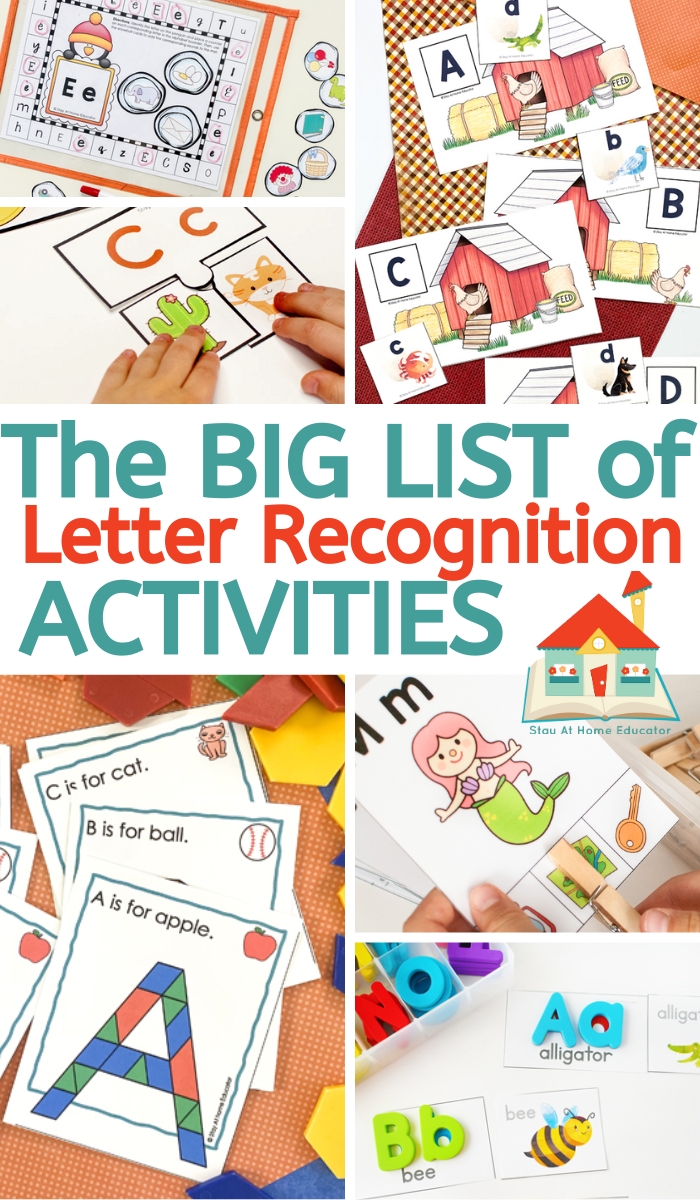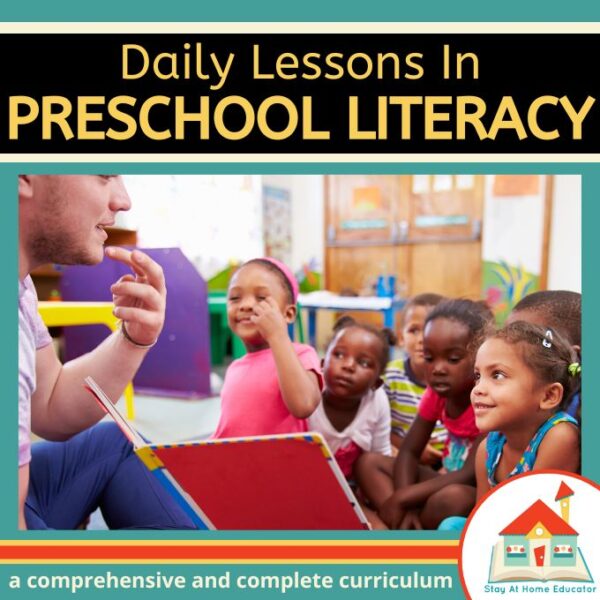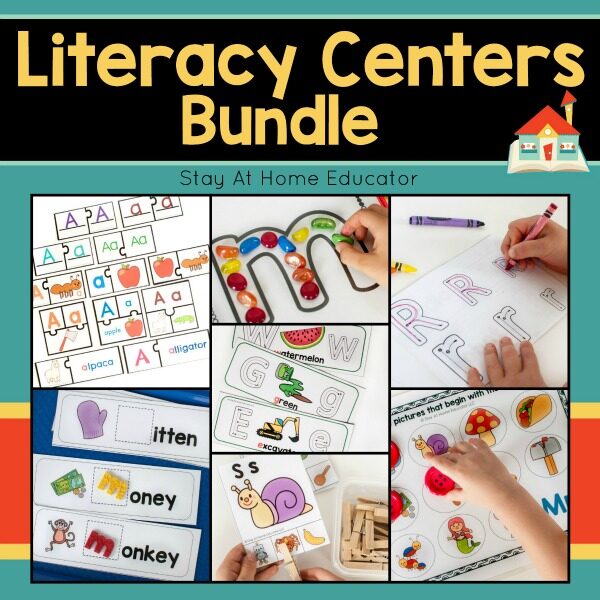How to teach letter recognition is going to be aided by fun and effective letter recognition activities. At Stay at Home Educator, we are huge advocates of systematic and explicit letter teaching! Every preschool teacher needs a dependable collection of letter identification activities to go along with their preschool literacy lesson plans.
From letter puzzles and worksheets to letter formation activities and games, this page will host all our best preschool activities for teaching letters.

Introducing preschooler to the alphabet is a pivotal step in their reading journey, and what better way to do so than through a variety of engaging letter recognition activities?
From their first experiences with the alphabet, and with the right resources, children embark on a path that creates an ease in learning to read when the time comes.
That’s why we’ve curated a collection of dynamic and fun-filled activities that cater to various learning styles, ensuring that every child’s journey to reading success is as exciting as it is educational.
By integrating these activities into your literacy lesson plans, you’ll not only lay a solid foundation for letter recognition but also cultivate a lifelong love for learning in your preschoolers.
-
Product on sale
 * Daily Lessons in Preschool Literacy CurriculumOriginal price was: $135.00.$99.00Current price is: $99.00.
* Daily Lessons in Preschool Literacy CurriculumOriginal price was: $135.00.$99.00Current price is: $99.00.
Letter Recognition Activities
Teaching letter recognition activities in preschool is a smart step to get young children ready for the world of reading.
When children learn about letters early, it helps them understand words better when they start reading books. Learning the alphabet and its sounds is a building block in early literacy. It is one of the foundational pieces in learning how to read and write.
Letter Recognition Skills
- Visual Discrimination – Seeing and letter apart from one another.
- This is about noticing and knowing the shapes of letters, like “b” and “d.”
- It helps us tell different letters apart, even if they look similar.
- Letter Naming – Being able to identify the letter.
- It involves knowing the names of uppercase and lowercase letters and being able to identify and name them accurately.
- Letter Formation – Letter formation refers to the ability to write or reproduce letters with proper shape, proportion, and direction.
- This means making letters with the right shape, size, and direction.
- Mastery of letter formation enables individuals to accurately write letters when engaging in handwriting tasks.
- Letter-Sound Correspondence – Understanding the relationship between letters and the sounds they represent in spoken language.
- It is the connection between letter recognition and phonemic awareness.
- This component helps individuals associate specific sounds or phonemes with each letter.
How to Teach Letter Recognition to Struggling Students
Teaching preschoolers to recognize letters is a big step toward helping them become good readers. It’s like giving them the tools to understand words and stories.
In these posts, we’ll explore effective strategies and creative activities that cater to the unique needs and developmental stages of preschoolers, ensuring a solid grasp of letters in a fun and meaningful way.
- The Ultimate Guide to the Alphabetic Principle
- Why Teach Letter Recognition in Early Childhood
- Understanding the Importance of Letter Recognition
- The Nuts & Bolts of Teaching Letter Identification
- The Right Order to Teach Letter Recognition
- What to Do When a Child Struggles with Letter Recognition
- Sound Foundations: Enhancing Early Literacy Through Letter Sound Recognition
- Teaching Alphabet Recognition: Strategies for Early Education
- Measuring Milestones: Letter Recognition Assessments
- Effective Letter Recognition Interventions
- Research-Based Strategies for Teaching Letter Recognition
Fun Ways to Teach Letter Recognition
It’s not secret that teaching the alphabet should be hands-on and fun at the same time!
When we use our hands to play and create with letters, it helps us remember them better.
Imagine making letters out of playdough, building towers of letters, or even making the shapes of letters – all of these activities turn learning into super fun ways to learn!
So, by adding a touch of creativity and playfulness, we can explore the world of letters in a way that’s not only educational for our preschoolers but also enjoyable.
Letter Recognition Games
It’s hard to get past the ease and simplicity of using letter recognition games to teach preschoolers about the alphabet.
We know that children learn best through play, so as teachers can can maximize on the benefits of play when teaching early literacy skills.
These letter recognition games for preschoolers are simple and straightforward, but also heaps of fun.
-
Product on sale
 * Preschool Literacy Centers BundleOriginal price was: $55.00.$45.00Current price is: $45.00.
* Preschool Literacy Centers BundleOriginal price was: $55.00.$45.00Current price is: $45.00.
Letter Puzzles
Teaching letter recognition through letter puzzle printables adds a fun twist to learning the alphabet.
It’s like putting together a cool puzzle, but instead of pictures, you’re solving the mystery of letters!
These printable letter puzzle activities make learning letters feel like a game, and as you match the pieces, you’re also getting to know each letter’s shape and sound.
Letter Formation Worksheets
Letter formation and alphabet knowledge go hand-in-hand. Letter recognition worksheets serve as a valuable tool to bolster fundamental skills like alphabet writing and letter sound correspondence.
These worksheets promote the differentiation of letters and their associated sounds and also establish a firmer grasp of the alphabet.
Through the practice of letter formation and identification, these alphabet tracing worksheets offer preschoolers a practical yet enjoyable pathway to acquiring letter knowledge.
-
Product on sale
 * Daily Lessons in Preschool Literacy CurriculumOriginal price was: $135.00.$99.00Current price is: $99.00.
* Daily Lessons in Preschool Literacy CurriculumOriginal price was: $135.00.$99.00Current price is: $99.00.
Letter Matching Printables
Letter matching activities are another fantastic tool for teaching preschoolers letter recognition and letter sounds. These activities typically involve tasks where children match uppercase and lowercase letters or associate letters with pictures and objects that start with the corresponding letter sound.
These are fun letter recognition activities preschoolers will love! ,They get hands-on experience while learning through what feels like play.
Letter matching activities also promote phonemic awareness as children often encounter words or objects that begin with the same sound as the letter they are matching. This connection between letters and sounds is fundamental in early reading and language development.
These are our very best letter matching printables for preschoolers.
Amazon offers a rich selection of letter recognition activities that cater to various age groups and skill levels.
From interactive educational apps and workbooks to hands-on board games and puzzles, these activities provide diverse options for children to develop their letter recognition skills while having fun.
With a wide range of themes, formats, and difficulty levels, Amazon's letter recognition activities make it easy for parents and educators to find engaging resources to support early literacy development.

I’m Sarah, an educator turned stay-at-home-mama of five! I’m the owner and creator of Stay At Home Educator, a website about intentional teaching and purposeful learning in the early childhood years. I’ve taught a range of levels, from preschool to college and a little bit of everything in between. Right now my focus is teaching my children and running a preschool from my home. Credentials include: Bachelors in Art, Masters in Curriculum and Instruction.








